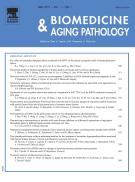Oxidant/antioxidant status in subjects with HIV infection in different clinical conditions - 13/08/14
 , Olga Sonia León-Fernández a, L Jorge Pérez-Ávila b
, Olga Sonia León-Fernández a, L Jorge Pérez-Ávila bAbstract |
Infection by human immunodeficiency virus (HIV) causes persistent chronic inflammation with sustained reactive oxygen species generation. An increasing number of studies underline the impact of the pathogenetic role of high-grade local and systemic oxidative stress in the evolution of HIV infection. The aim of this study was to investigate the redox status in HIV individuals of different clinical conditions. Also progression and rutinaries biomarkers were evaluated. Blood samples were drawn from 120 HIV positive (age 44±13years) and 40 presumable healthy (age 47±4 years) subjects. The HIV individuals were divided in three groups according clinical conditions: asymptomatic, aids (acquired immune deficiency syndrome) and aids with delayed diagnosis. Total peroxide, malondialdehyde and advanced oxidation protein products as damage indexes and antioxidant responses (glutathione, peroxidation potential, superoxide dismutase and catalase) were determined from the blood samples. Also haematological and chemical indexes and progression indexes (viral load, T CD4+ lymphocyte absolute count) were assessed. Relatively to the control group, HIV-infected patients had significant differences in global indices of damage and antioxidant status (P<0.05). The comparison between the groups revealed that the aids with delayed diagnosis group had a significantly higher damage and lower antioxidant status compared to the control, HIV asymptomatic and aids group’ (P<0.05). Multivariate statistical model clearly separated groups according progression indexes and redox profile. These results corroborate that substantial oxidative stress occurs during HIV infection evolution. Considering early diagnostics, prevention and treatment of HIV, redox indexes would be worthwhile to conduct a more comprehensive study and manage of infection.
El texto completo de este artículo está disponible en PDF.Keywords : HIV, Aids, Oxidative stress, Redox diagnostic
Esquema
Vol 4 - N° 3
P. 235-242 - juillet 2014 Regresar al númeroBienvenido a EM-consulte, la referencia de los profesionales de la salud.
El acceso al texto completo de este artículo requiere una suscripción.
¿Ya suscrito a @@106933@@ revista ?

